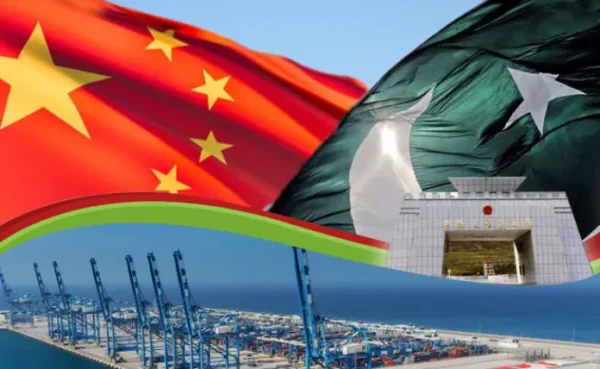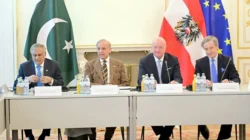CPEC: Transforming Pakistan’s Geo-Economic Landscape

23 May 2024
Published in: Pakistan observer
Connectivity in the 21st century is a defining feature of the modern economy and comprehensive development. In order to unlock the potential of closely interlinked production networks and value chains, a more comprehensive perspective on connectivity emerged led by President Xi Jingpin of China. This connectivity is not sector specific but is envisaged as part of an integrated whole, encompassing the development of corridors of prosperity through networks of trade, transport, energy, flow of people, goods, services, communication, and technology that allow for greater efficiency in the distribution of resources.
China-Pakistan Economic Corridor (CPEC) is, therefore, high on the policy agenda of both China and Pakistan as it is contributing to the realization of Pakistan’s national developmental goals and is a practical manifestation of Pakistan’s pivot to geo-economics. It is a people-centric development project and represents a win-win proposition of international cooperation providing new opportunities for economic rejuvenation and prosperity of both countries and other regions.
Through CPEC, China and Pakistan have jointly provided the sub-regions of South Asia, Central Asia and West Asia with a connectivity network and have laid a strong and stable foundation of a lasting, broad-based regional as well as trans-regional cooperation. CPEC is also the distinctive symbol of enduring Pakistan-China friendship and a clear manifestation of the desire of leadership on both sides to take the economic and trade relations to new heights to commensurate with the political and strategic relationship. CPEC covers a vast array of short, medium and long-term projects. This model of development fully resonates with Pakistan’s own vision and firm belief that CPEC is a “game-changer” not only for Pakistan but the entire region and presents enormous opportunities to people from Gwadar to Kashgar and beyond.
CPEC through Gwadar port has not only provided China a better access to the Middle East, which is also an important market for Pakistani exports, but has also provided the Middle East a direct route to Central Asia and beyond. Similarly Africa’s economic potential is huge with trillions of untapped natural resources and high youth percentage. Pakistan with its Look Africa policy is keenly interested in enhancing trade and investment relations with Africa. CPEC thus provides a massive and critical platform for achieving this objective which will be mutually beneficial for both Pakistan and Africa.
Due to the immense economic and strategic value of CPEC, several potential threats to it can be identified including: emerging-market uncertainties, commercial and political frictions between countries, the proliferation of low-level conflict, and slow progress on global challenges. The China containment policy of the USA currently forms the most important instance of great-power competition in the existing interstate system. As a result, it holds within itself the key to the all-important question of global stability, peace and socio-economic development. Therefore, looking at it from all perspectives, CPEC is an important and essential element of BRI and has, in the last ten years, rightly received the attention and focus that it deserves from both Pakistan and China.
The first phase of CPEC, which is almost complete, has had a positive impact on the lives of millions of Pakistanis by providing better access to resources, modern infrastructure, addressing the critical energy deficit, creating employment opportunities and enhancing the country’s capacity for transit and industrialization.
CPEC can serve as a womb for the birth of Pakistan’s blue economy. CPEC offers an immense opportunity to explore and exploit the untapped blue economy of Pakistan. With CPEC and robust Gwadar port, the dream to capitalize on the country’s blue economy for sustainable growth can be realized. Gwadar is a deep sea port which has a great potential in terms of trade, marine transportation, off-shore exploration, tourism, aqua resort and deep sea fisheries. After the full execution of the master plan of Gwadar city under CPEC, the city would become the Singapore of Pakistan with a GDP of $30 billion by 2050 with the production of 1.2 million jobs for the locals.
Multilateral cooperation for CPEC development is a key priority. The integration of CPEC with the Economic Cooperation Organization (ECO) should be promoted and new development realities like the recent China-Iran 25-year partnership deal should be utilized for the regionalization of CPEC. Under a trilateral Agreement China, Pakistan and Afghanistan will identify feasible projects to help Afghanistan meet infrastructure and development deficit.
The implementation has encountered difficulties in Pakistan, especially due to internal security concerns. Pakistan has taken measures to address these problems, such as military operations and the formation of a special security unit, but a long-term resolution requires enduring solutions and heightened security measures.
If there is continuity in Pakistan’s economic policies, along with political stability, investment in CPEC and other projects will continue to grow. CPEC is a geostrategically significant project for both China and Pakistan. It will enable China to get out of the Malacca dilemma and provide an alternative trade route to China. For Pakistan, CPEC is a ray of hope in the prevailing tough economic and geopolitical environment, where it has limited foreign policy options.





